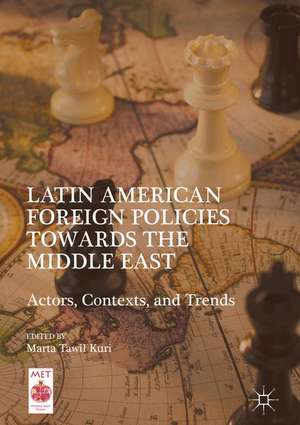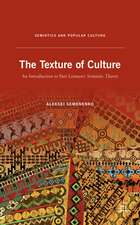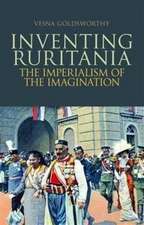Latin American Foreign Policies towards the Middle East: Actors, Contexts, and Trends: Middle East Today
Editat de Marta Tawil Kurien Limba Engleză Hardback – 23 noi 2016
This volume surveys the interplay between state and non-state actors in Latin American foreign policies and attitudes towards the Middle East in the twenty-first century. How will domestic instability and international tensions affect the choices and behavior of Latin American countries towards the Arab world? The chapters here offer insight into this and similar questions, as well as a comparative value in analyzing countries beyond those specifically discussed. Common topics in policy making are considered–namely, Israel and Palestine, Iran, the Gulf countries, and the Arab "Spring”–as authors from distinct disciplines examine the crucial relation between ends and means on the one hand, and foreign policy actions and context on the other.
| Toate formatele și edițiile | Preț | Express |
|---|---|---|
| Paperback (1) | 638.89 lei 6-8 săpt. | |
| Palgrave Macmillan US – 21 iun 2018 | 638.89 lei 6-8 săpt. | |
| Hardback (1) | 642.83 lei 6-8 săpt. | |
| Palgrave Macmillan US – 23 noi 2016 | 642.83 lei 6-8 săpt. |
Din seria Middle East Today
-
 Preț: 306.57 lei
Preț: 306.57 lei - 8%
 Preț: 459.53 lei
Preț: 459.53 lei - 18%
 Preț: 687.44 lei
Preț: 687.44 lei - 18%
 Preț: 896.39 lei
Preț: 896.39 lei - 15%
 Preț: 696.68 lei
Preț: 696.68 lei - 18%
 Preț: 1004.00 lei
Preț: 1004.00 lei - 18%
 Preț: 898.26 lei
Preț: 898.26 lei - 15%
 Preț: 471.69 lei
Preț: 471.69 lei -
 Preț: 389.70 lei
Preț: 389.70 lei -
 Preț: 390.08 lei
Preț: 390.08 lei - 15%
 Preț: 497.77 lei
Preț: 497.77 lei -
 Preț: 391.61 lei
Preț: 391.61 lei - 15%
 Preț: 659.70 lei
Preț: 659.70 lei - 18%
 Preț: 731.41 lei
Preț: 731.41 lei -
 Preț: 387.75 lei
Preț: 387.75 lei - 18%
 Preț: 728.60 lei
Preț: 728.60 lei - 18%
 Preț: 726.37 lei
Preț: 726.37 lei - 15%
 Preț: 643.34 lei
Preț: 643.34 lei - 15%
 Preț: 696.50 lei
Preț: 696.50 lei -
 Preț: 389.70 lei
Preț: 389.70 lei - 15%
 Preț: 586.55 lei
Preț: 586.55 lei -
 Preț: 384.86 lei
Preț: 384.86 lei -
 Preț: 389.70 lei
Preț: 389.70 lei -
 Preț: 383.93 lei
Preț: 383.93 lei -
 Preț: 388.72 lei
Preț: 388.72 lei -
 Preț: 390.63 lei
Preț: 390.63 lei -
 Preț: 387.75 lei
Preț: 387.75 lei -
 Preț: 388.72 lei
Preț: 388.72 lei -
 Preț: 418.67 lei
Preț: 418.67 lei - 15%
 Preț: 642.51 lei
Preț: 642.51 lei - 15%
 Preț: 643.34 lei
Preț: 643.34 lei - 15%
 Preț: 584.92 lei
Preț: 584.92 lei -
 Preț: 425.80 lei
Preț: 425.80 lei -
 Preț: 386.81 lei
Preț: 386.81 lei
Preț: 642.83 lei
Preț vechi: 756.27 lei
-15% Nou
Puncte Express: 964
Preț estimativ în valută:
123.01€ • 131.54$ • 102.56£
123.01€ • 131.54$ • 102.56£
Carte tipărită la comandă
Livrare economică 18 aprilie-02 mai
Preluare comenzi: 021 569.72.76
Specificații
ISBN-13: 9781137601308
ISBN-10: 1137601302
Pagini: 315
Ilustrații: XV, 296 p. 14 illus. in color.
Dimensiuni: 148 x 210 x 23 mm
Greutate: 0.49 kg
Ediția:1st ed. 2016
Editura: Palgrave Macmillan US
Colecția Palgrave Macmillan
Seria Middle East Today
Locul publicării:New York, United States
ISBN-10: 1137601302
Pagini: 315
Ilustrații: XV, 296 p. 14 illus. in color.
Dimensiuni: 148 x 210 x 23 mm
Greutate: 0.49 kg
Ediția:1st ed. 2016
Editura: Palgrave Macmillan US
Colecția Palgrave Macmillan
Seria Middle East Today
Locul publicării:New York, United States
Cuprins
Chapter 1 : How Latin America Met the Arab World: Toward A Political Economy of Arab-Latin American Relations.- Chapter 2: Brazil’s Relations With Middle Eastern Countries: A Diplomacy In Search For Constancy (2003-2014).- Chapter 3: Chilean Foreign Policy Towards Arab Countries: Between Trade Diplomacy And The Affirmation Of Principles.- Chapter 4: Multipolarity Under Construction: New Paths And Difficult Balances In The Argentina-Middle East Relation During The Kirchner Governments.- Chapter 5: Venezuela and the Middle East Under Hugo Chávez (1999-2013): Strategic Continuities And Ideological Preferences.- Chapter 6: Colombian fragile foreign relations with the Middle East: vested interests, 2000 – 2014.- Chapter 7: Ecuador and The Middle East: Counter-Hegemony, Anti-Interventionism And Sovereign Wealth Funds.- Chapter 8: Bolivia’s Foreign Policy toward the Middle East (2000-2015): Promoting aPopulist and Radical Agenda Abroad.- Chapter 9: Between Continuity and Change: Relations Between Costa Rica And The Middle East.- Chapter 10: Nicaraguan Foreign Policy towards the Middle East.- Chapter 11: Mexico’s Policy towards the Middle East: From Equidistance to Distance.- Chapter 12: Conclusions.
Notă biografică
Marta Tawil Kuri is Research Professor at the Center for International Studies at the College of Mexico, where she teaches on Mexico’s relations with the Middle East, international relations, comparative foreign policy, and contemporary Middle East politics. She obtained her Master’s degree in Comparative Politics of the Arab and Muslim world and her PhD in Political Science and International Relations, both at the Institute of Political Sciences in Paris. She is the author of Syria: Regional Power, Legitimacy and Foreign Policy, 1996-2015 and co-editor of The End of a Secular Dream: Religion and International Relations at the Turn of the Century. She is a member of RIMAAL and of the board of the Mexican Association for International Studies.
Textul de pe ultima copertă
This volume surveys the interplay between state and non-state actors in Latin American foreign policies and attitudes towards the Middle East in the twenty-first century. How will domestic instability and international tensions affect the choices and behavior of Latin American countries towards the Arab world? The chapters here offer insight into this and similar questions, as well as a comparative value in analyzing countries beyond those specifically discussed. Common topics in policy making are considered–namely, Israel and Palestine, Iran, the Gulf countries, and the Arab "Spring”–as authors from distinct disciplines examine the crucial relation between ends and means on the one hand, and foreign policy actions and context on the other.
Caracteristici
First volume to really address how Latin America has designed and implemented policies toward the Middle East in the twenty-first century Interrogates what the Middle East reveals about the present and future of Latin American politics, its international relations and its foreign policy options Examines the foreign policies of Argentina, Bolivia, Brazil, Chile, Colombia, Mexico, Nicaragua, Costa Rica, Ecuador, and Venezuela, focusing on current developments within the past fifteen years, with appropriate attention to the historic context in each country








